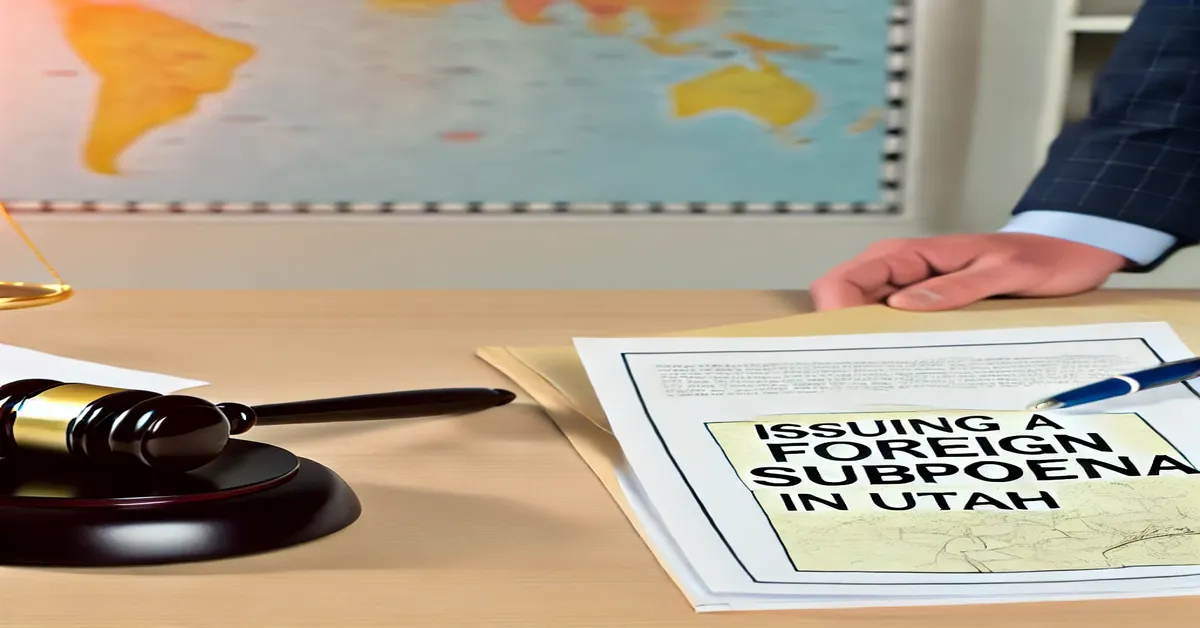Understanding the intricacies of issuing a foreign subpoena in Utah is crucial for those navigating legal processes involving out-of-state parties. Whether you’re an attorney, a litigant, or someone new to the legal field, knowing the steps and regulations surrounding this process can save you time, reduce confusion, and ensure compliance with Utah laws. This article breaks down the essential aspects of foreign subpoenas in Utah, providing a clear roadmap to help you through the process.
What is a Foreign Subpoena?
A foreign subpoena is a legal tool issued in one state but intended for service in another. These subpoenas typically request evidence, documentation, or testimony from someone who resides or conducts business outside the jurisdiction of the court where the case is being heard. They are commonly used in multi-state litigation or cases where witnesses or evidence are located in different states.
In Utah, as in many other states, there are specific procedures to follow when serving a foreign subpoena. Ignoring these steps can lead to delays, non-compliance issues, or even the invalidation of the subpoena.
Why Issuing a Foreign Subpoena in Utah Requires Special Attention
Utah has adopted the Uniform Interstate Depositions and Discovery Act (UIDDA), a framework that simplifies the process of issuing subpoenas across state lines. However, understanding the nuances of the UIDDA and how it applies in Utah is essential for successfully navigating this legal process.
Utah’s adoption of UIDDA ensures uniformity, but each state has its unique procedural requirements. In Utah, for example, you must properly domesticate the foreign subpoena before it can be served. Without adhering to these steps, your subpoena may not be enforceable.
The Legal Framework: Utah and the UIDDA
The UIDDA was designed to streamline the often-complicated process of cross-border discovery. In Utah, this act enables parties to issue subpoenas in out-of-state legal matters with less bureaucratic red tape than in the past.
The UIDDA provides a standardized method for:
- Domesticating subpoenas from out of state.
- Serving them in Utah under the jurisdiction of Utah’s courts.
- Ensuring compliance with Utah’s discovery rules.
This framework eliminates the need to open a separate legal proceeding in Utah, as long as the issuing party adheres to the proper procedures.
How to Issue a Foreign Subpoena in Utah
The process of issuing a foreign subpoena in Utah typically involves a few critical steps:
Understanding Domestication
Domestication is the process of validating and recognizing an out-of-state subpoena in Utah’s legal system. A foreign subpoena cannot be directly enforced in Utah; it must first be recognized by a Utah court.
Filing the Foreign Subpoena
To domesticate a subpoena in Utah, the issuing party must submit it to a Utah court clerk. Here’s what you need to know:
- Prepare the Required Documents: You’ll need to provide the original subpoena issued by the out-of-state court and any relevant case information.
- Comply with Utah’s Format: The Utah court will issue a new subpoena that mirrors the original but conforms to the state’s legal requirements.
- Pay the Applicable Fees: Filing fees may apply and vary by jurisdiction.
Serving the Subpoena
Once the Utah court has issued the subpoena, it must be served on the recipient. Utah law requires that subpoenas be served in accordance with its procedural rules, ensuring that the recipient is notified properly.
- Who Can Serve?: Subpoenas in Utah can be served by a sheriff, a process server, or any individual over the age of 18 who is not a party to the case.
- Timeframe for Compliance: Ensure that the subpoena allows reasonable time for compliance, taking into account the recipient’s location and the complexity of the request.
Challenges You May Encounter
Navigating the legal requirements for issuing a foreign subpoena in Utah isn’t without challenges. Understanding these potential pitfalls can help you avoid delays or complications:
- Incorrect Formatting: Ensure that your subpoena complies with Utah’s specific formatting and language requirements.
- Insufficient Notice: Allow adequate time for the recipient to respond or comply with the subpoena.
- Jurisdictional Issues: Verify that the Utah court has proper jurisdiction to enforce the subpoena.
Failing to address these issues may result in the subpoena being quashed or ignored, undermining your legal efforts.
The Role of Attorneys in Foreign Subpoenas
Hiring a Utah-based attorney can be invaluable when dealing with foreign subpoenas. An attorney familiar with Utah’s rules and procedures can streamline the process, ensuring that all legal requirements are met.
- Legal Guidance: Attorneys can advise on the specifics of UIDDA and how it applies to your case.
- Drafting and Filing: They can prepare and file the subpoena to ensure it meets Utah’s standards.
- Enforcement: Should the recipient refuse to comply, an attorney can assist in enforcing the subpoena through the court system.
Tips for Successfully Issuing a Foreign Subpoena in Utah
Start Early
The process of domesticating and serving a foreign subpoena can take time. Start the process well in advance to avoid delays that could impact your case.
Research Utah’s Legal Requirements
While the UIDDA provides a standardized framework, Utah may have unique requirements that must be followed. Familiarize yourself with these rules or consult with a local expert.
Maintain Clear Communication
Keep the lines of communication open with the recipient of the subpoena. Clear instructions and reasonable deadlines can improve compliance rates and reduce the need for enforcement actions.
Compliance and Enforcement
Once the subpoena is served, the recipient is legally obligated to comply. However, non-compliance can sometimes occur, necessitating further legal action.
- Seeking Court Enforcement: If the recipient refuses to comply, you may need to petition the court to enforce the subpoena.
- Handling Objections: The recipient may file objections, which must be addressed in court. Having an attorney can help you navigate this phase.
Why Understanding the Process Matters
Failing to correctly issue a foreign subpoena in Utah can result in wasted time, increased costs, and potential legal setbacks. By thoroughly understanding the process and adhering to the rules, you can ensure your subpoena is enforceable and serves its intended purpose.
Whether you’re gathering evidence, securing testimony, or obtaining critical documents, proper issuance of a foreign subpoena can make or break your case.
Final Thoughts
Issuing a foreign subpoena in Utah doesn’t have to be a daunting process. With the right preparation and understanding of the state’s legal requirements, you can navigate the process smoothly and efficiently. Whether you choose to handle it independently or seek legal assistance, adhering to Utah’s procedures is the key to success.
The Uniform Interstate Depositions and Discovery Act has simplified the process, but staying informed and proactive is essential. When in doubt, consult with a Utah-based attorney to ensure compliance and achieve the best possible outcome for your case.











